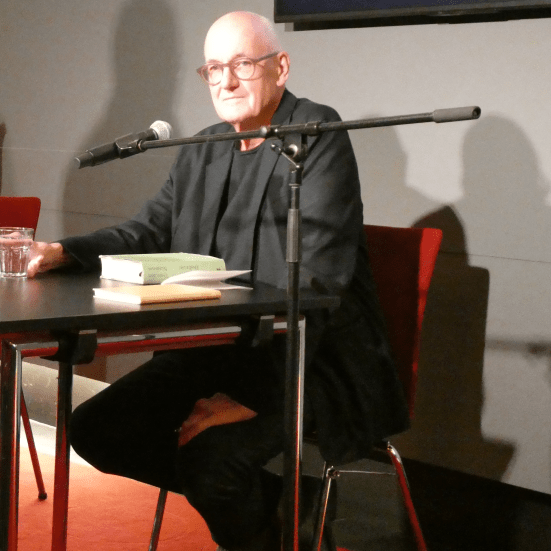"It was the intoxication of the rhythm that gripped me"

Poet Michael Donhauser was a guest at Poetry@Rubens.
Are they prose poems, nature poetry or nature writing? Michael Donhauser does not quite want to categorize his poems in the volume "Unter dem Nussbaum". However, he is certain that he would rather be counted among the experimental than the traditional writers: "Writing my own kind of poetry is closer to me than the traditional." He continues: "I belong to a generation in Vienna that is under the red-white-red seal of quality. That's why you have to be experimental." Michael Donhauser, an Austrian citizen born in Vaduz in 1956, was a guest at "Poetry@Rubens" in the foyer of the Apollo Theater. The format was established at the university in 2007. Donhauser accepted an invitation from Prof. Dr. Dieter Schönecker to Siegen and read from the volume "Unter dem Nussbaum".
Nature is omnipresent in his poetry. Schönecker: "Today, you don't always know what a poem is about. You do." Poems with titles such as "Die Amsel", "Der Holunder", "Die Linde", "Die Schwertlilien", "Das Gestrüpp" stand for themes close to nature. The publisher Matthes&Seitz writes about these: "A cessation, a straightening up, a breath of attention all in black - with these words, almost forty years ago, Michael Donhauser set off on a poetic flight that has not lost any of its height, verve or versatility to this day. Carried by a wind that sets the rhythm, sometimes roaring, shaking the trees, the roses, then dying down again, like a breath in everything, blowing from afar and celebrating, Donhauser's poetry has since explored the world a little more with each verse, looking around and listening, fanning it out and allowing it to be sensually experienced in a work committed solely to poetic perception. A work that by no means comes to an end with Unter dem Nussbaum, but rather rises up in new texts with a view to what has already been published, scattered and believed to be lost, a flapping of wings towards that place where it becomes clear what poems are capable of." Donhauser: "It was the intoxication of rhythm that gripped me."
"What I do is close to prose," admits Michael Donhauser in conversation with his predominantly student audience. However, it is not detailed realism. He continues: "I've never called it nature poetry, but I can understand why it's seen that way." The poetry was written while sitting in the garden or in parks. City poetry, according to the author, does not work so well for him.
Michael Donhauser is also known for his "break poems", in which he changes the direction of thought in the middle of a sentence with an "and": "You think the sentence continues differently, the train of thought is interrupted. This is like the destruction of logical syntax." Perhaps, according to Prof. Schönecker, this is a means of "breaking the naked beauty of the poems".
Michael Donhauser was recently awarded the Eichendorff Prize 2025. According to the jury's statement, Donhauser is an author whose work "allows us to realize again and again what power and beauty poetry can still have".
Michael Donhauser moved from Vaduz to Vienna in the mid-1970s to study. He completed this with a thesis on the various German translations of Les Fleurs du mal by Charles Baudelaire and subsequently lived there as a freelance author. His first literary work, Der Holunder, a collection of prose poems, was published in 1986. Donhauser translated Arthur Rimbaud and Francis Ponge from French. In his poetry and lyrical prose, he deals with questions of form. In his literary work, he is less concerned with observation than with recording what he perceives. The question of temporality, of passing and simultaneity, is at the heart of his work. Donhauser has been awarded several poetry prizes for his work.
A week earlier, the author Lena Schätte was a guest in Siegen as part of Poetry@Rubens. She read from her novel "Das Schwarz unter den Händen meines Vaters". Das Schwarz an den Händen meines Vaters by Lena Schätte is a moving novel about growing up in a family that lives in so-called simple circumstances and at the same time sticks together when it counts. It is a tough, tender novel about love for a difficult father and the path to life", according to the publisher Fischer.